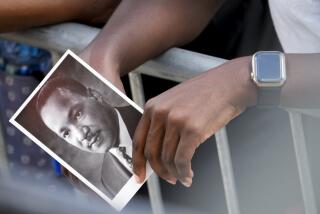Letters: Civil rights soundtrack
- Share via
Re “Protest songs still march on,” Aug. 28
As Harry Belafonte notes, folk and gospel music galvanized support for the 1963 March on Washington. Just as important, however, was the emergence of rock ‘n’ roll, which prompted musical — and societal — desegregation.
Before Elvis Presley’s recording debut in 1954, radio stations were musically segregated. Stations were either white — in management, listeners and featured artists — or black.
Presley created a quandary by being a white singer who sounded black. Then Chuck Berry debuted in 1955 as a black singer whose lyrical tales and idioms resonated with whites.
To further befuddle radio station managers, integrated rock ‘n’ roll vocal groups such as the Del-Vikings and the Crests formed and became popular by the late 1950s.
Hence, radio’s audience and artist segregation soon evaporated. This harmonious turn served to set the civil rights stage, musically and societally.
Christine Hagel
Orcutt, Calif.
ALSO:
Letters: Time Warner’s PR debacle
Letters: When men are depressed
Letters: The wages fast-food workers deserve
More to Read
A cure for the common opinion
Get thought-provoking perspectives with our weekly newsletter.
You may occasionally receive promotional content from the Los Angeles Times.






